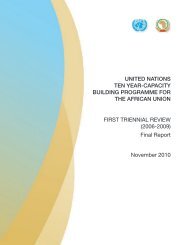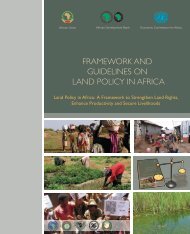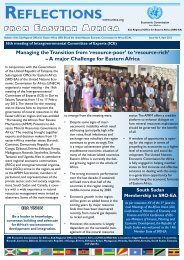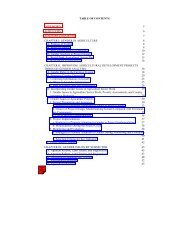A Decade of NEPAD - Economic Commission for Africa - uneca
A Decade of NEPAD - Economic Commission for Africa - uneca
A Decade of NEPAD - Economic Commission for Africa - uneca
Create successful ePaper yourself
Turn your PDF publications into a flip-book with our unique Google optimized e-Paper software.
Under the theme “Strengthening Democracy Through<br />
<strong>NEPAD</strong>: The Role <strong>of</strong> <strong>Africa</strong>n Civil Society”, on May 26-<br />
27, 2003, seventy representatives <strong>of</strong> civil society groups<br />
in <strong>Africa</strong> from the southern, eastern, western and central<br />
<strong>Africa</strong>n regions met over two days in Johannesburg, South<br />
<strong>Africa</strong> to discuss questions <strong>of</strong> how to strengthen democracy<br />
through <strong>NEPAD</strong>.<br />
The major themes discussed at the conference included: the<br />
consolidation <strong>of</strong> democracy in <strong>Africa</strong> over the last decade,<br />
the relationship between institutions and governance and<br />
civil society’s participation in institutions <strong>of</strong> governance.<br />
Delegates at the conference identified a number <strong>of</strong> concrete<br />
strategies <strong>for</strong> tackling the challenges confronting civil<br />
society in its engagement with the <strong>Africa</strong>n Peer Review<br />
Mechanism.<br />
The strategies proposed were aimed at addressing the<br />
need to publicise and share research findings, the need to<br />
establish civil society ‘nodes’ to improve co-ordination,<br />
the need <strong>for</strong> the establishment <strong>of</strong> a working group, and the<br />
need to establish a Pan <strong>Africa</strong>n Civil Society. The major<br />
task <strong>of</strong> the working group was to be concerned with the<br />
setting <strong>of</strong> norms and standards <strong>for</strong> credible democratic<br />
governance, with special focus on improving elections and<br />
the accountability <strong>of</strong> public representatives.<br />
The working group was to be comprised <strong>of</strong> two civil society<br />
representatives from each <strong>of</strong> the four <strong>Africa</strong>n regions<br />
participating in the conference. The working group was<br />
tasked with sketching the way <strong>for</strong>ward toward the establishment<br />
<strong>of</strong> a Pan <strong>Africa</strong>n Civil Society Forum on <strong>NEPAD</strong><br />
and increasing CSO participation within the <strong>Africa</strong>n Peer<br />
Review Mechanism (APRM). The Electoral Institute <strong>of</strong><br />
South <strong>Africa</strong> (EISA) was requested and agreed to per<strong>for</strong>m<br />
a co-ordinating role in the establishment <strong>of</strong> the Forum.<br />
Parallel to the South <strong>Africa</strong> gathering, on May 28-30, 2003<br />
under the theme, Mobilizing Support <strong>for</strong> the New Partnership<br />
<strong>for</strong> <strong>Africa</strong>’s Development: The Role <strong>of</strong> the Private Sector<br />
and Civil Society, a workshop was convened in Accra,<br />
Ghana by the U.N.’s Office <strong>of</strong> the Special Advisor (OSSA).<br />
This workshop concluded that the AU provisional Civil<br />
Society Working Group was not actively working on NE-<br />
PAD at a time when there was a pressing need <strong>for</strong> clarity<br />
on the roles and responsibilities <strong>of</strong> the AU versus those <strong>of</strong><br />
<strong>NEPAD</strong>. There was also an expressed need <strong>for</strong> a <strong>NEPAD</strong><br />
CSO focal point to be appointed at the national level. There<br />
5. <strong>NEPAD</strong> and the <strong>Africa</strong>n Civil Society Today A <strong>Decade</strong> <strong>of</strong> <strong>NEPAD</strong><br />
was also a belief that there were capacity constraints that<br />
needed to be addressed to ensure that the civil society<br />
could play a greater role in the <strong>NEPAD</strong> process.<br />
In part, in response to these various findings and critiques,<br />
in 2004, the <strong>NEPAD</strong> Secretariat established the<br />
Gender, Civil Society and Parliamentary Affairs Unit to<br />
ensure that civil society organizations were more effectively<br />
mobilized to participate in the <strong>NEPAD</strong> implementation<br />
process, to engage with <strong>Africa</strong>n parliamentarians, and to<br />
spearhead gender mainstreaming in all <strong>NEPAD</strong> policies<br />
and programmes.<br />
In addition to the establishment <strong>of</strong> a CSO focal point at<br />
the <strong>NEPAD</strong> Secretariat, the commencement <strong>of</strong> the <strong>Africa</strong>n<br />
Peer Review Mechanism process also significantly<br />
helped to accelerate the participation <strong>of</strong> <strong>Africa</strong>n CSOs in<br />
the <strong>NEPAD</strong> process.<br />
One <strong>of</strong> the biggest tensions which exists within the <strong>Africa</strong>n<br />
development context is balancing internationally accepted<br />
good governance practices with the development policies<br />
that take into account the unique challenges and circumstances<br />
<strong>of</strong> the <strong>Africa</strong>n context. <strong>NEPAD</strong> addresses this<br />
tension through the APRM, an initiative whose purpose<br />
it is to facilitate a contextual assessment <strong>of</strong> each member<br />
state’s institutions and governance practices. It seeks to help<br />
improve these institutions and each country’s governance<br />
practices through shared experiences and the dissemination<br />
<strong>of</strong> best practices.<br />
The APRM is not intended to be a governance watchdog<br />
but rather to encourage engagement between the government,<br />
the private sector and civil society, as well as the<br />
engagement <strong>of</strong> other like-minded <strong>Africa</strong>n states that are<br />
committed to improving their own institutions and governance<br />
practices.<br />
The scope <strong>of</strong> the assessment under the APRM includes<br />
a comprehensive review <strong>of</strong> each country’s: 1) political,<br />
2) economic, 3) corporate and 4) socio-developmental<br />
institutions, policies and practices.<br />
The APRM process is voluntary and non-antagonistic.<br />
States must indicate a firm commitment to enhancing their<br />
governance practices by submitting to periodic country<br />
reviews from their peers.<br />
67







